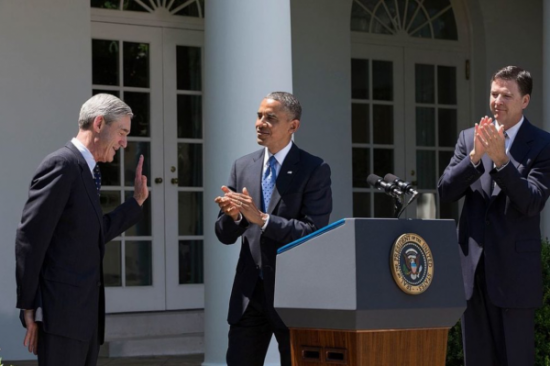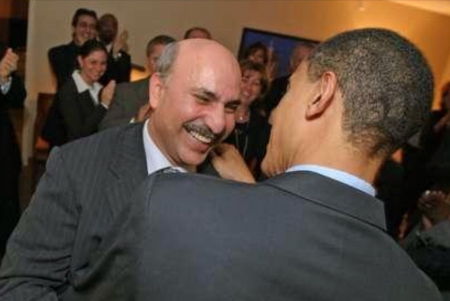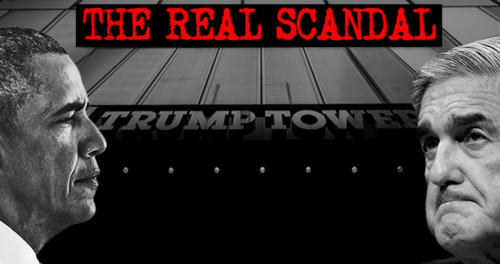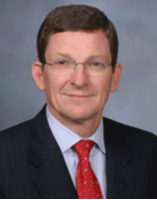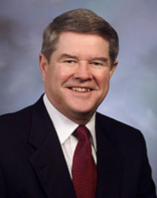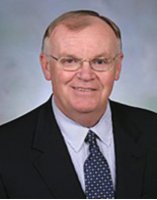REZKO, OBAMA, AND THE NADHMI AUCHI RAILROAD LINKING CHICAGO, WASHINGTON, AND BAGHDAD (Part 3 of 3)
Guest Writer, John A. Shaw
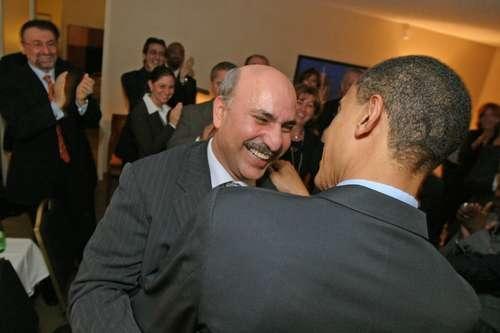
PART 3: OBAMA – PASSENGER ON THE AUCHI CHICAGO-D.C. EXPRESS
Nadhmi Auchi, despite his purchased respectability in England, was the financial eminence behind the Chicago-Arab combine, and the man who, with Rezko, helped invent Barack Obama as a political star.
Rezko was sent to Chicago by Auchi, just as Vladimir Lenin was sent in a sealed train to the Finland Station by the Germans to be a political virus planted in the Russian body politic. Auchi outdid the Germans of that era who dreamed of a Berlin-to-Baghdad Railway: Auchi built a longer Baghdad-to-Chicago Railway, one that ran through Washington, D.C.
Auchi helped buy Barack Obama his ticket to Washington – all the way to the White House. His Conductor was Antoin “Tony” Rezko,
Arab financiers tend to deal only with men with whom they have developed a trusted relationship over a long period of time.Rezko indictment documents prepared by U.S. Attorney Patrick Fitzgerald in 2008, showed the extent that Rezko had been involved with Auchi over time in a series of corrupt deals in Iraq. The indictment established that their relationship predated Auchi’s arrival in Chicago, and probably Rezko's arrival there as well. Rezko was sent there to pave the way for Auchi. Until then, it was not evident that they had been long-term business associates outside the U.S.
Rezko, through Auchi, had the resources needed to build an Arab-American system compatible with Chicago, but not identified with Auchi. Rezko was a small scale entrepreneur and contact-seeker who, thanks to Auchi’s untraceable money, had the financial muscle to gain contracts and donate to political campaigns.
In retrospect, Rezko may seem to have been a weak link in the Auchi system, but he had all the skills needed to operate at the street-level in Chicago. He made useful friends, got politically connected, and built his network. He entered housing and hospital service worlds at the ground floor and snaked his way,al la Auchi himself, into small contracts in Chicago that led tobigger contracts, there and beyond. He became a genuine part ofthe “Chicago Way,” rather than just Auchi’s facilitator for the combine.
Rezko is in jail, but the foundations he laid in Chicago on behalf of Auchi are still there. The Auchi railroad is not out of business there. It is merely parked on a side-track until after the 2012 election.
Auchi ensured that Rezko, and others in the Chicago clan like Aiham al’Sammara’e, got into the Iraq contracting game when those opportunities began to arise in spades after the Iraq invasion in 2003. Al Sammara’e, an Iraqi American, who can be seen below seated to Blago's left at their Chicago rendezvous in April 2004, went back to Iraq to become Minister of Electricity. There he helped usher in a series of deals involving both Rezko and Auchi, showing how adaptable the Chicago combine had become, and how Auchi’s surfacing in Chicago energized the whole of his operation.

Thanks to Auchi’s money, Rezko helped Rod Blagojevich get elected to Congress, and then to the Illinois Governor’s office. And, while he first failed to get Barack Obama into Congress, he ultimately helped him get elected to the Illinois State Senate, and then to the United States Senate.

While Rezko and Blagojevich had been compromised by the time Obama was en route to the White House, Auchi thought he had merely experienced an unjust series of setbacks: A felony conviction in France, and his outing as the No. 1 corruption figure in post-invasion Iraq.
He ignored the conviction, as it was “under appeal,” and set out to do whatever he could to discredit my DoD report about his role in Iraq telecom scam. He tried, unsuccessfully, to smear me with false accusations concerning actions I had taken to thwart his fixing of the telecom deal in Iraq.
In Chicago, Auchi retrenched financially and bought out Rezko’s interest in the South Side land deal that would probably have housed part of the Olympic Village for the 2016 Olympics.
After momentarily retrenching, he revealed the extent of his continuing involvement in Chicago by hosting a major fete for Jesse Jackson in London in October 2010. The Chicago Machine left Auchi no doubt his visa will be restored before January 2013 and that Rezko will be pardoned by President Obama, whatever the outcome of the election. All that, as the Arabs say, is “in the pocket”.
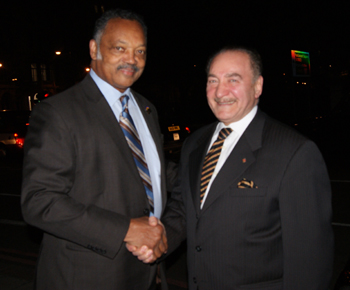
It should now be clear that Auchi was not auditioning for a role with Blago and Obama on his trip to Chicago in April, 2004, as the Chicago media reported. He was coming to make good on his Chicago investments, and, particularly, to cash in on his South Side land deal, which involved several important people in the city government, some of whom went with Obama to Washington four years later to ensconce themselves in the White House so that they could return to the Chicago trough after a decent interval.
Rahm Emmanuel is now the Mayor of Chicago. Valerie Jarrett, born in Iran, remains as Obama’s main counselor at the White House, but she was an unwitting facilitator for Auchi and Rezko in their Chicago organization.
Auchi’s Middle East hub in Chicago remains strong and viable. He now characterizes the South Side land deal as a property-development project that will be worth over two billion dollars. And that could well be true, given the seed money his combine planted in Chicago still in place.
Auchi knows that, for the first time since Elf/Aquitaine, he was caught fixing a major contract, this one under U.S. rather than French jurisdiction. It was also the first instance where he was seen to bribe foreigners as part of an intelligence operation with both British and U.S. elements, and one which had the apparent approval of a small cadre of people in the U.S. government determined to use telecommunications to shape new leadership in Iraq.
Auchi overplayed his hand in Iraq because he thought he had all the support he needed with a bribed American contact as his Coalition Provisional Authority (CPA) operator in Baghdad, and with the Pentagon support group as the guarantor of his success. Yet, just as his bribed contact’s inexperience and incompetence was the proximate cause of Auchi’s exposure in the Iraq telephone caper, it was the self-destruction of Ahmed Chalabi, the Pentagon’s chosen candidate, that thwarted his support group’s plans.
Chalabi, who had once been a business colleague of Auchi, was not wholly trusted by him, and was only able to become one of Auchi’s anointed beneficiaries because the Pentagon support group wanted him to become the George Washington of Iraq.
The telecom fix in Iraq was, for Auchi, a vehicle for making money. He fed at that trough and moved on. Auchi’s bribed American insider and his combine at the Ministry of Communications had been taken care of and were expendable, the same way Rezko was in Chicago, and Chalabi was in Baghdad.
Auchi’s intelligence service sponsors presumably cashed in on whatever advantages they had sought from their relationship, and no doubt look forward to further mutual efforts with Auchi in Europe, the Middle East, and perhaps even the U.S. Auchi has, after all, brought a new diversity to the American Middle West.
The group at the Pentagon had missed an important attribute of Auchi’s: He was President of the Anglo-Arab Organisation, the stridently pro-Arab lobbying group that provided the lead for their causes in the U.K. and beyond, especially opposition to Israel; Middle East Online , supported by Auchi, is stridently anti-Semitic and Auchi himself took the lead in supporting the recent Turkish flotilla sailing to end the Gaza blockade. While Auchi is adept at making his way through and around Arab politics and sectarian divisions, he is dependably supportive of the Arab cause in anything that involves Israel. His building of the railroad to Chicago, with its Black Muslims presence, takes on a more sinister air when the extent of his commitment to widely-held Arab and Muslim interests is considered.
In Iraq, Auchi wasted no time in advancing his combine beyond telecom to electricity, then into the health sector and the chase for oil leases. With the ability to influence Maliki, Auchi won everything worth getting in Iraq.
In Chicago, the Arab combine is still alive, if less well off, and Auchi is working with the new city government to develop his considerable land holdings there.
His man is President of the United States as Auchi awaits the return of his visa and Rezko’s pardon.
Today, the incriminating evidence against him from Iraq is boxed up in the office of Gary Shapiro, the new U.S. Attorney in Chicago who had long been Fitzpatrick’s First Assistant, to be forgotten by the New Year. That material was passed from the DoD, to the Department of Justice, and then down to U.S. Attorney Patrick Fitzpatrick’s office for further investigation. And there it sits.
Whether Obama wins or loses in November, Auchi will profit, because his Chicago, Washington, Baghdad Railroad is in operation. So, watch your step!
All aboard!
Previously in this series:
Part 1: REZKO,OBAMA, AND THE NADHMI AUCHI RAILROAD LINKING CHICAGO, WASHINGTON, AND BAGHDAD (Part 1of 3)
Part 2: NADHMI AUCHI: THE RAILROAD ENGINEER(Part 2 of 3)
John A. Shaw, a former senior official of the Defense, State, and Commerce departments, served on several White House staffs. He is a specialist in international technology transfer and arms sales, and in the economic development of the Middle East.
REZKO, OBAMA, AND THE NADHMI AUCHI RAILROAD LINKING CHICAGO, WASHINGTON, AND BAGHDAD (Part 2 of 3)
Guest Writer, John A. Shaw
PART 2: A SNAPSHOT OF AUCHI’S METHODS: FIXING THE CONTRACT FOR THE IRAQI CELLULAR PHONE SYSTEM
This exposure of Nadhmi Auchi’s master plan to insert himself into the American political process comes after a decade of investigation revealing a two-pronged story that (1) charts the development of a criminal conspiracy, and, at the same time, (2) describes how Auchi’s self-serving plans intersected with a normal governmental oversight function at the U.S. Department of Defense (DoD) during the Iraq War.
My office at the DoD surfaced Auchi’s central role in the largest case of corruption in Iraq reconstruction in a “preliminary” 120-pages report dated May, 2004. I labeled the report “preliminary” because I anticipated it would be fully followed-up by the DoD Inspector General’s office. Unfortunately, that did not happen.
Here is the story in brief: Auchi had been inserted into U.S. reconstruction plans for Iraq by Ahmed Chalabi, a onetime business partner of Auchi’s. Chalabi was being promoted by a small circle of people at the Pentagon who wanted to assure pro-American leadership in post-Saddam Iraq. No one outside the circle knew anything about their specific plans, but everyone knew that Chalabi, a secular Shia with a non-sectarian agenda, was the favorite choice.
To his unwitting Pentagon supporters, everything depended on Chalabi having the support, both political and financial, to get to the top. None of his Pentagon supporters’ actions were improper or remotely illegal. Their aim was to assure that the award of the first cellular telephone contracts ever issued in Iraq went to dependable candidates for national leadership: one for the northern (and Kurdish) area to Jalal Talibani; one for the central zone (including Baghdad) to Ibrahim al-Jaafari; and one for the southern (largely Shia) area to Ahmed Chalabi.
The contracts, worth $3 billion, would assure funding for the three Iraqi leaders. It would provide them, in Chicago-street parlance, “street money” for two years.
The telecom tender appeared, at that time, to involve only Iraqis and Iraqi money. It was, initially, meant to be an Iraqi system, built for Iraqis, by Iraqis. But American money was ultimately involved.
Auchi was an independent facilitator, doing what he had done in Iraq, and throughout the region, his entire adult life – fixing deals.
My 2004 report established Nadhmi Auchi as a major figure in Iraqi corruption, both under the Saddam Hussein regime, and today. Information gathered by the various U.S. authorities since 2004, however, indicates that Auchi has been the central figure in Iraqi institutional corruption for the past decade.
I accidently discovered Auchi’s role in the telecom fix, but had no idea it was part of an intelligence operation. In the end, that discovery was as fateful for Auchi as was the discovery of the extent of Rezko’s role in the Pay-to-Play scheme in Illinois. Together, the two revelations threatened to destroy both legs of Auchi’s railroad.
Auchi bribed a U.S. government official involved in letting contracts for the Iraqi cellular phone system. The bribed employee’s (and Auchi’s) role was revealed by two reports I received on the same day in January, 2004.
The first was a letter from the British Ambassador to Deputy Secretary of Defense Paul Wolfowitz that asked about my investigation of the Brits who had been involved in the fix, and about whom I had spoken to Jeremy Greenstock, the British Ambassador to the CPA.
The second report was from a reliable Arab source in Baghdad. It noted a conversation with a man privy to the payoff pattern in the Ministry of Communications. The conversation fingered three people whom Auchi had paid off “to take care of” the Ministry of Communications: Haider al-Abadi, a Dawa Party member who was the Minister of Communications; Ibrahim al-Jaafari, the head of the Dawa party and putative prime minister; and someone with a name very similar to that of the American official that Auchi bribed. When given the man’s name, the source said, “Yes, yes, do you know him?” That told us we had a direct line connecting Auchi to suborning the contract letting process.
On April 10, 2004 the appointed audit firm for the CPA, BearingPoint, reported that corrupted official’s office had “few to no” reliable financial controls in place, and that all paper and electronic records were gone. More importantly, $240 million was missing from the ministry account for which the official was responsible; half of it in Iraqi funds, and the rest in U.S. funds. To date, no one has traced any of that money.
The bribed official was fired the following day and immediately left Iraq. He was never questioned, nor investigated, either about those funds or about the Auchi bribe.
Auchi and the corrupt U.S. official needed to discredit me and my report, so they said that I, a former Senate-confirmed Inspector General, had tried to create a sweetheart deal for a U.S. company in Southern California which was the only bidder offering more advanced American CDMA technology. This technology was interoperable with the older French Groupe Spécial Mobile (GSM) standard prevalent in the region. I was supportive of it, not only because it used U.S. next-generation technology, but because it was secure, and hence offered a response to the tide of GSM-triggered explosive devices throughout Iraq. Had the Southern California firm won the bidding, we would have seen hundreds, perhaps thousands, fewer IED casualties in Iraq.
The FBI spent a year and a quarter of a million dollars to establish that I had done nothing wrong, much less anything criminal, in carrying out my responsibilities in Iraq and Washington.
Auchi had acted to ensure the victory of his clients, literally at any cost, and the intelligence people wanted the older GSM standard so they could use it to easily eavesdrop on the Iraqis. The winning contracts went to Orascom, which was partially owned by Auchi, and two other newly created consortia, Asia Cell and Atheer, for whom Auchi had orchestrated the financing. All three companies used the old French GSM standard.
That Auchi was the ringmaster of the telecom fix was confirmed by Mehdi al-Rahim, a respected Iraqi banker and a member of the Iraq Communications Oversight Board reviewing the phone contracts. He was given a copy of my report in Washington shortly after it was published in 2004. “Everyone knows that Auchi was right in the middle of this,” he said.
The report on how Auchi, with the aid of the corrupt U.S. official, fixed the cellular telephone contracts illustrates how he operates on a major scale. It not only documented a quintessential Auchi deal, but its revelations resulted in his U.S. visa being revoked by the FBI.
Auchi has not been allowed to enter the U.S. since my May 2004 report. And, despite his optimistic commentary about his prospects in Chicago, Auchi knows that Rezko has made him politically radioactive there. Nevertheless, he counts on being cleansed of that radiation in January 2013. Even if Obama is not reelected, Auchi knows he can still make a lot of money in Chicago.
Auchi’s ability to fix the three Iraqi cellular phone contracts for three Iraqi politicians was the highpoint of his involvement in Iraq after the invasion. He believed it was the prelude to a similar coup in Chicago. He thought he had become untouchable, both because the false image he had propagated to court respectability in the West had never been questioned, and because his activities in the U.S. had assured his central role in the Iraqi reconstruction.
The hubris Auchi exhibited in the Iraq telecom deal, however, led to the erosion of his carefully crafted tale about his background. The investigation underlying the DoD report blew Auchi’s cover story and began to erode his status in the U.S. Ironically, his success in Iraq may have ensured the unraveling of his U.S. activities.
At the DoD he was pursued by an outgunned Deputy Undersecretary, but in Chicago he faced an experienced U.S. Attorney in Patrick Fitzgerald who had been the Special Prosecutor in the Libby/Plame case. It was Fitzgerald who, in pursuing the Illinois pay-to-play scandal, surfaced Antoin “Tony” Rezko as the major bagman he was.
Auchi, although prevented from entering the United States because of his central role in the largest corruption case in Iraq reconstruction, remains engaged through his network in the Chicago political scene, and through his investment in Chicago projects valued at several billion dollars.
Auchi’s success with Obama would ultimately depend on how closely identified Obama would become with Rezko and the money Rezko provided.
In the end, Auchi had a gambler’s good luck. He gambled on having the Chicago Machine on his side and won; he gambled on having an inattentive news media and won; and, he had the money he needed to gamble successfully.
The mainstream media studiously avoided any serious investigation of the extent of Obama’s ties to Rezko, or to any of the others in the local Arab-American combine, even though by 2008 Auchi had funneled nearly $200 million through Rezko into Chicago projects, and had financed the purchase of Obama’s house in 2005.
Here’s where the media failed: They looked at Obama, Rezko, and the Arab network in Chicago through the wrong end of the telescope. By the time Rezko was in trouble, Obama had become untouchable. The press wanted to believe him to be, and therefore portrayed him as, extraordinary, which he certainly was.
The press, also, wanted to believe that Rezko was the product of squalid street politics that were not worthy of Barack Obama. So they effectively ignored the confluence of Obama’s interests and those pursued by Auchi’s Arab network which helped nurture Obama.
COMING NEXT - PART 3: OBAMA – PASSENGER ON THE AUCHI CHICAGO-D.C. EXPRESS
PREVIOUSLY – Part I: REZKO, OBAMA, AND THE NADHMI AUCHI RAILROAD LINKING CHICAGO, WASHINGTON, AND BAGHDAD (Part 1 of 3)
___________________________________________________________________________________
About the Author:
John A. Shaw, a former senior official of the Defense, State, and Commerce departments, served on several White House staffs. He is a specialist in international technology transfer and arms sales, and in the economic development of the Middle East.
Note: Web links were editorially added to enable readers toreadily access basic background information concerning persons, organizations, and documents. Links do not represent the range of information available on the web concerning those topics.
REZKO, OBAMA, AND THE NADHMI AUCHI RAILROAD LINKING CHICAGO, WASHINGTON, AND BAGHDAD (Part 1of 3)
Guest Writer, John A. Shaw
“Shaw served as Deputy Undersecretary of Defense for International Technology Security and in a variety of other senior U.S. Government positions. Prior to his appointment by former Defense Secretary Rumsfeld, Shaw was President and CEO of the American Overseas Clinics Corporation. Prior senior positions in the government included the White House staffs of Presidents Nixon, Ford, Reagan, and Bush I. He served as White House Liaison to the US Defense Department under President Ford and to the US State Department under President Reagan. Shaw received a B.A. from Williams College, as well as a Bachelors, Masters, and Ph.D. from Cambridge University,He has taught international security studies at Cambridge University, Williams College, Georgetown University, and theInstitut d'Etudes Politiques in Paris.” (Source)
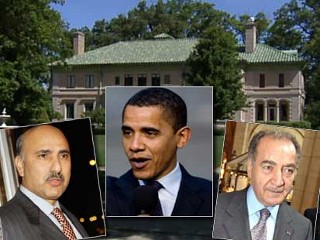
PART I. NADHMI AUCHI: THE RAILROAD ENGINEER
The kingpin of Iraqi corruption, Nadhmi Auchi, and his Chicago henchman, Antoin “Tony” Rezko, built a well-financed network of political influence in Chicago over several decades. Barack Obama is its most famous beneficiary.
Nadhmi Auchi is an Iraqi-born billionaire who relocated from Baghdad to London in 1980 where he adopted British citizenship.
Auchi is the engineer who designed a new political railroad that connects the Middle East to the Middle West, with tracks that run through Washington. Auchi financed it all. Think of him as the empire builder for the Chicago, Washington & Baghdad Railroad, with Tony Rezko as Conductor, and Barack Obama as its favored Passenger.
Auchi’s efforts to play a role in American policy-making go back to the Jimmy Carter presidency. It took Auchi three decades to lay a track that reached into the U.S. intelligence community and built a spy ring operating out of Detroit funded by U.N. Oil-for-Food vouchers.
Auchi first appeared on the American scene backed by recommendations from European allies regarding his abilities and dependability. He arrived just as the U.S. was looking to lay tracks to Iraq at the commencement of the Iran-Iraq War. Once his bona fides were established in America, Auchi became a certified Washington player.
The First Gulf War provided Auchi an opportunity to ingratiate him with Pentagon figures whose influence would continue a decade later with the onset of the Iraq War. It gave him the Big Chance he sought.
In time, Auchi was seen as a transatlantic statesman with the magical, transformative ability to affect change everywhere in the world. He sold himself as a global entrepreneur who built a European empire and now wanted to extend it, in a helpful way, into America.
The substance of Auchi’s leverage was simple: Money, the mother’s milk of politics. As was his wont, the money went though middle men, multiple cut-outs, and a complex international financial grid, so that there were no Auchi fingerprints left on anything. It is the standard Auchi method of securing influence over politicians.
Auchi bought influence in the old way with the Democrats. But while his money generally went to Democratic causes and candidates, intermittent Republican control of the White House enabled Auchi’s influence to spread through his charitable donations to G.O.P. causes, and by bringing his substantive capabilities and sympathetic demeanor to their deliberations and problems concerning the Middle East.
In short, he came to be seen as a statesman and business wizard by men of stature in Washington as he created a positive reputation that transcended party lines.
Through the years, Auchi gained access to the Clinton White House and both Bush White Houses. Today, he is able to influence the Obama White House.
Auchi began as the international banker for Saddam Hussein. For Saddam, he bought national leaders the same way Rezko bought state boards, state senators and, eventually, a governor.
A man who has followed Auchi’s activity closely for twenty five years, and who has held senior positions in the U.S. government, reflects due awe over “the suborning tactics of the patriarch of Arab deal making.” Auchi’s genius, this man says, “is not to start with the deals, but to master the environment so as to suborn it. After that he can drive a Mack truck through the environment. He is patient and wily, a master operator. He finds willing surrogates, like Rezko, to ply local folks in the ‘target’ zone with money and favors, not with grease ball stunts like cash in envelopes (though he does that very well too); he will do whatever it takes. His commitment is for the long term, and his involvement is concealed until everything is in place, be it in Baghdad, Cairo, London, Paris, or Chicago.” The source adds that Auchi has developed a legion of surrogates, both Arab and Western, to act on his behalf so that his involvement in any deal is seldom overt. Everything he does tends to be understated, or denied.
Auchi’s apparent invulnerability comes from two sources: The first is his investment and accompanying avalanche of philanthropy. The above observer notes that “his real gift is to enshroud the whole criminal enterprise in ‘good works’ and charitable giving, stuffed full of medals and titles and ceremonial dinners and cross-cultural ‘peace-making’ exercises. Who would dare bring down such a worthy man…hiding, if you will, in plain view?”
The second reason for his invulnerability is that, by 1980, he had became a major asset of British Intelligence, MI6, enabling him to gain entry into any situation, into anywhere in the Arab world or Europe, and into any problem, financial or political.
His connection with MI6 provided Auchi with an entrée into U.S. intelligence via Lord Cavendish’s, former head of MI6, introduction to a small transatlantic group called Le Cercle,which focused on mutual national security interests. From then on Auchi enjoyed, relying heavily on his charitable donations, access to the U.S. policy-making nexus dealing with the Middle East and North Africa. Meanwhile, his Chicago-based political organization financially greased the skids to give him access to the White House across several administrations.
British journalists universally believe in Auchi’s protective symbiosis with MI6. The best evidence of that is how it took eighteen months for the French government to get Auchi extradited from Britain for trial in the Elf/Aquitaine case. He returned to France, was convicted of getting a $100 million kickback, and admitted to all the charges against him, saying only that he had been told by the President de la Republique that there was no problem. He obviously has no problem with the British Government either.
The cover given Auchi by Whitehall, plus his ability to sue anyone who dared surface any facts about his continuing corruption activities, assured a continuing safe haven for him in London. MI6 basically has given Auchi a license to steal, and allowed him to buy respectability through charitable donations and good works apart from his business dealings. He has been granted a coat of arms by the Queen, and has been knighted by the Pope.
Auchi has bought the leadership of the Labour and Liberal Democrat parties, and a measure of benign neglect from the Conservative party. He found them no less pliable than their neighbors across the Channel, or around the Mediterranean, who have been available for sale all his adult life. His General Mediterranean Holdings (GMH) is an appropriate name for Auchi’s financial empire.
Auchi has a clear, long-term strategy. He has been running a financial operation, parallel to that in the U.S., quite successfully in Great Britain and across Europe for a generation. He was a central, but shadowy, figure in the so-called London Group, which the Special Inspector General for Iraq Reconstruction identified as the hub of in-country Iraqi corruption after the 2003 invasion.
Some echoes of Auchi’s methodology can be found in Britain where a pharmaceutical firm run by his daughter was indicted by the Serious Fraud Office at the Treasury for the largest fraud in the history of the National Health Service, but then was absolved. Hospital and medical investments have been a part of Auchi’s strategy, not only in the U.K., but elsewhere in Europe, in Iraq, and in Chicago. He has been feted by the Royal Society of Medicine, and by its counterparts, from Cairo to Chicago.
Nadhmi Auchi was one of Saddam Hussein’s most able and aggressive arms dealers when he came into my purview about twenty five years ago when I had responsibility for foreign military sales for the U.S. government.
As time went on, and I gained greater and greater involvement in the Middle East, I watched Auchi build his financial empire with his brilliant combination of political manipulation, financial genius, and ruthless opportunism. For three decades, I have followed arms and technology trade in the Middle East, and, for that reason, I have an acute sense of Auchi’s operational methods.
I have spoken at length to people who know Auchi well, and to a legion of people who have observed him closely over decades. Most of them do not wish to be identified, either because they do not want their sources to dry up, or out of simple fear. I know of three deaths, two of them outright murders, in which Auchi is a lingering spectral figure. One of them was an American contractor who came to my Pentagon office to tell me how he had been defrauded of $25 million dollars by a Lebanese banker in Iraq. Three days later, he and his partner were shot to death by a hit squad northwest of Baghdad.
What follows is an attempt to put together an overview of the Auchi’s concerted effort over those three decades to insinuate himself into the American political process and into various policy avenues in which he could both provide benefit and derive profit and power. It is necessarily a puzzle with many of the pieces missing. But the pieces that are conjoined provide a sketch of Auchi in action.
The myth propagated by Auchi is that he left Baghdad in 1980 because of disaffection with Saddam. In fact, he left Baghdad with a large chunk of Saddam’s and Muammar Ghaddafi’s overseas money, which became the nexus for his Luxembourg enterprise, GMH.
The reality is that, for well over a decade, Auchi was the main financial operator in Europe for Saddam, who established him everywhere as his principal financial guy. In 1993, Jamil al-Amdar, then Saddam’s main man in China, when seeking asylum in the West, confirmed that “Saddam’s enforcer for Europe is his cousin, Barsan al-Tikriti, who had diplomatic status from a U.N. post in Vienna, but his main money man in Europe and the West, was Nadhmi Auchi.”
Auchi has woven another myth that he broke with Saddam over the killing of his brother. But, in fact, that murder arose from his brother’s attempts to take over a Saddam pipeline deal.
For the next three decades Auchi built up his empire in Europe, the Middle East, and the U.S., with the U.S. as his ultimate and richest target, and with Saddam providing the money.
Auchi’s overarching ability is to spread money around politically and use it to leverage lucrative government and commercial contracts. His role as Saddam’s banker allowed him to build his GMH into the largest stockholder in BNP Parisbas, which, thanks to Auchi, became the trough for the U.N. Oil-for-Food scam. (A researcher for the Volker Report on the U.N. Oil-for-Food program confirmed that, while Auchi’s name never appeared in the report, his fingerprints were evident across the program; French political pressure prevented its inclusion in the report).
Auchi was found guilty in 2003 of taking a million dollar kickback in the Elf-Aquitaine scandal in France, the largest corruption case in French history. His influence with successive presidents of France assured that he was only given a suspended prison sentence and a several million dollar fine. He returned to England unscathed.
A good indicator of Auchi’s methods of operation and reach can be found in David Ignatius’s 1994 novel, The Bank of Fear, where the main antagonist is based wholly on Auchi. The novel reflects the history of the two decades after 1980 when Auchi was the unacknowledged but actual financial front man for Saddam in Europe. Ignatius had started to write an expose of Auchi and his dealings, but decided that the British libel laws made a novel a wiser alternative.
COMING NEXT - PART II: A SNAPSHOT OF AUCHI’S METHODS: FIXING THE CONTRACT FOR THE IRAQI CELLULAR PHONE SYSTEM
Robert Mueller has a history of meddling in elections
Marty Watters, Invesigative Reporter
Robert Mueller has a history of meddling in elections.
In 2008, when the Deep State chose Barack Obama to be the 44th POTUS, it called on its lead legal-fixer, FBI Director Robert Mueller III, to clear Obama’s road to the Oval Office.
As ordered, Mueller followed the Deep State playbook and found a patsy to deflect attention away from Obama's questionable activities and nefarious friends in Chicagoland.
Mueller’s patsy was the likable but dimwitted Illinois governor, Rod “Hot Rod” Blagojevich, a politician with more charisma than good sense. Mueller’s “investigation” of Blagojevich transformed Obama's bagman, Antoin “Tony” Rezko, into Blago’s nightmare. By the way, Tony was also a Chicago and Detroit bagman for Saddam Hussein’s former international banker and Obama friend, Nadhmi Auchi. But that’s another story.
For several years, informants – none dare call them spies – and three, wired moles – all convicted of crimes and awaiting sentencing – shoveled slam dunk evidence to the FBI that was used to indict Blago.
One of those "informants," Bernard Barton (AKA: John Thomas) was released from the custody of the Long Island Office of the Eastern District of New York by U.S. Attorney…wait for it…Loretta Lynch, and sent to the U.S. Attorney’s Office of Northern Illinois in Chicago led by Patrick Fitzgerald, where he was given a new identity, and assigned to worm his way into Rezko’s confidence. Not as a spy, of course.
Mueller, a reincarnation of Eliot Ness in the minds of some, dragged the investigation of Blago on for six years, even allowing him to be reelected governor. Only after Obama was elected President did the FBI arrest Blago. By the way, the timing of Blago’s arrest provided cover for Obama’s Co-Campaign Chair, Jesse Jackson, Jr. who was, at the time of Blago’s arrest, in the process of bribing Blago to appoint him to Obama’s Senate seat. But that, too, is another story.
It worked out well for Obama.
He went to the White House. Blago went to the Big House, where he sits today.
Meanwhile, the Chicago media, particularly the Tribune and the Sun Times, were delighted to help the Deep State legal eagles, Mueller, Deputy Attorney General James Comey, and then U.S. Attorney Patrick Fitzgerald – now one of Comey’s lawyers – clear the way for Obama’s ascendency to D.C.
Doesn't that sound familiar? That's exactly what the Deep State operatives in the DoJ and FBI tried to do for Hillary Clinton in the 2016 election.
Unfortunately for them, Trump is light years smarter than “Hot Rod.”
If Trump commutes Blago’s sentence, as is rumored these days, he should only do so if Blago goes public with what he knows about Robert Mueller's corrupt alliance with Barack Obama.
More to come...
Patrick Fitzgerald’s “not not denial” that he warned Blagojevich
Ernie Souchak, Editor-in-chief

Was former U.S. Attorney Patrick Fitzgerald displaying his intellectual shortcomings or was he just being duplicitous when he was given the opportunity to deny that he was the one who ultimately warned Governor Rod Blagojevich that he was recording Blago's phone conversations?
In a recent phone call Fitzgerald was asked directly:
"Do you deny that the U.S. Attorney's Office had communications with the Chicago Tribune about the Blagojevich case on Dec. 4, 2008?"
Fitzgerald's response: "I'm not denying it and I'm not not denying it."
Really, Patrick? "Not not denying it"?
You either deny it or you don't.
And for the record, you did "not deny" communicating with the Chicago Tribune before you decided to "not not deny" communicating with them.
What's next, Patrick? Are you and former White House counsel Greg Craig, who is now your law partner at Skadden, Arps, Slate, Meagher & Flom LLP, going to do Abbott and Costello's "Who's on first" routine for us?
And by the way is "not not" the kind of nonsense you teach the students at the University of Chicago Law School in your capacity as a Feirson Distinguished Lecturer?
If so, they will never be able to practice law anywhere but Chicago.
From:(redacted)
To: Sarah Galer
Cc: amgardn, andaws
Sent: March 29, 2013 at 10:59 AM
Subject: Feirson Distinguished Lecturer
Ms. Sarah Galer
Please inform Patrick Fitzgerald that the Office of Professional Responsibility and the U.S. Inspector Generals Office would be who conducts an investigation of a U.S. Attorney.
I would have thought a "Feirson Distinguished Lecturer" would know that.
< name redacted >
p.s. Perhaps Mr. Fitzgerald's 1st lecture could be on this very subject.
-----Original Message-----
From:(redacted)
To: Patrick Fitzgerald
Cc: Aaron Goldstein , Sheldon Sorosky
Sent: 2013-03-29 02:46:11 +0000
Subject: Fwd: Media inquiry/Patrick Fitzgerald
Mr. Patrick Fitzgerald
You are on the record claiming that you do not know who would investigate the U.S. Attorney's Office regarding the leaks to John Chase and the Chicago Tribune.
Do you agree, there should be an investigation?
< name redacted >
-----Original Message-----
From:(redacted)
To: sgaler@uchicago.edu
Sent: 2013-03-27 09:34:58 GMT
Subject: Media inquiry/Patrick Fitzgerald
Ms. Sarah Galer
The fact that the University of Chicago Law School is welcoming former U.S. Attorney Patrick Fitzgerald to be part of your schools program. And, that your showering him with accolades at a time that he is embroiled in controversy. Leads me to believe that you might not be aware of just how serious this may ultimately be for your institutions reputation.
Are you aware of the following?
And, if so, have you done due diligence?
U.S. Attorney Patrick Fitzgerald “Most Dangerous Man”
https://illinoispaytoplay.com/2013/02/09/turns-out-u-s-attorney-patrick-fitzgerald-most-dangerous/
Why no Grand Jury? Chicago Tribune reporter John Chase involved in a crime. AGAIN!
https://illinoispaytoplay.com/2013/03/09/why-no-grand-jury-chicago-tribune-reporter-john-chase-involved-in-a-crime-again/
< name redacted >
Former U.S. Attorney Patrick J. Fitzgerald named Feirson Distinguished Lecturer
In Fitzgerald's defense, there is the distinct possibility that he really is this stupid. And let's face it, if he truly is mentally challenged, how would he know unless someone told him?
After all, the media does nothing but tell Fitzgerald how wonderfully smart he is.
In fact, the fawning Chicago media actually remained silent as Fitzgerald declared during a press conference about the Blagojevich case that the leaks to the Tribune "might have come from his office so he could not investigate them," and that he "had no idea who would investigate".
Wow! Can you believe that?
Amazingly, no one in the adoring mainstream media insisted that Fitzgerald explain those ridiculously stupid statements.
Well, Patrick, IP2P has news for you: you're not as bright as the media has led you to believe.
And now that it appears that Blagojevich will get out of prison soon, we insist that you explain your asinine statements about the leaks from your office to the Chicago Tribune.
And while you're at it, Fitz, you also need to explain to the public why you buried irrefutable evidence that:
(A) Sibel Edmonds gave you in the Plamegate scandal;
(B) John A. Shaw gave you in the Nadhmi Auchi scandal; and
(C) I, Ernie Souchak, gave you in the Blagojevich scandal.
Not to mention the well-documented burying of evidence you did in the Southern District of New York.
To be continued...
American Thinker’s credibility is dissipating quickly
Ernie Souchak, Editor-in-Chief
American Thinker's credibility is dissipating quickly.
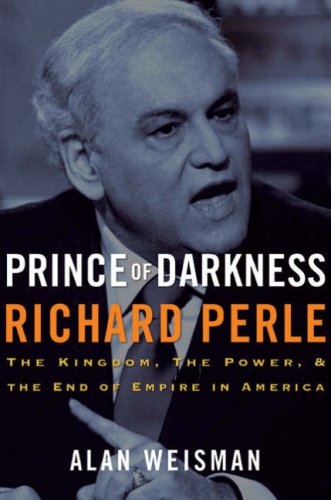
You see, not disclosing conflicts of interest is turning out to be the norm at American Thinker.
For example: IP2P recently informed its readers of Clarice Feldman's close personal relationship with Richard Perle, whom she frequently goes on the attack for and staunchly defends. As in the case of her baseless attack on Sibel Edmonds.
Now IP2P has also learned that Feldman shares a close friendship with Paul Wolfowitz and Douglas Feith. And as is the case with Perle, she has never disclosed her conflict of interest when attacking others on their behalf.
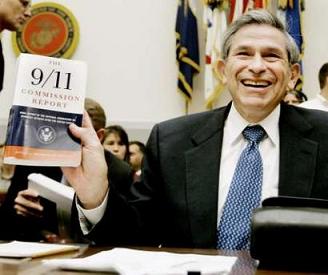
Nor has American Thinker editor Thomas Lifson required her to do so.
Keeping American Thinker's failure to disclose in mind, let me tell you some other disturbing facts that will have you asking this question: Who is really running the show over at American Thinker?
On September 20, 2012 American Thinker posted an article by Lee Cary entitled "Obama's Chicago Arab-American network comes into focus".
Cary's article states some unflattering facts about a man named Nadhmi Auchi, aka. Saddam Hussein's bag man.
Naturally Auchi did not appreciate this article and to no one's surprise he instructed his lawyers at the London law firm Carter-Ruck to send a letter threatening legal action if said article was not taken down.
Upon receiving Auchi's letter, Lifson took the article down momentarily to verify that it was completely factual. After determining that it was correct, Lifson promptly reposted Cary's article unchanged.
That's because Lee Cary's work was solid, and contributor John A. Shaw is as honest and credible a man as you will ever find.
Taking down that article would have given the public the perception that there was something wrong with the story. And that clearly would not be fair to either Cary or Shaw.
At that time IP2P, which was also named in the letter from Auchi's law firm, posted an article praising American Thinker for doing the right thing.
Due to many factors, including Auchi's inability to legally enter the United States, the letter from his lawyers was an idle threat. And that should have been the end of the story.
Unfortunately that happy ending was not to be.
What happened next was that someone on this side of the pond told Lifson to take the article down. And he did, a second time!
We can not tell you exactly who it was at the moment, we can tell that it was not Nadhmi Auchi or his people, according to Lifson.
Could it have been one of Clarice Feldman's close friends? Perhaps Wolfowitz, Perle or Feith?
In any case, if that wasn't bad enough, Lifson then had the audacity to think that IP2P would take the article down as well. And for some peculiar reason, he would not even tell us why.
Of course Lifson received a prompt, "Hell no!"
In fact, we at IP2P still feel that Thomas Lifson owes Cary and Shaw a formal apology for removing their article a second time from American Thinker without even giving them the courtesy of an explanation.
And more importantly, due to recent revelations about American Thinker's close ties to the Washington elite, Lifson needs to publicly address his publication's controversial policy of not disclosing conflicts of interest.
Read the article that Thomas Lifson took down twice here:
Obama's Chicago Arab-American network comes into focus
Related articles by John A. Shaw
REZKO, OBAMA, AND THE NADHMI AUCHI RAILROAD LINKING CHICAGO, WASHINGTON, AND BAGHDAD (Part 1 of 3)
REZKO, OBAMA, AND THE NADHMI AUCHI RAILROAD LINKING CHICAGO, WASHINGTON, AND BAGHDAD (Part 2 of 3)
REZKO, OBAMA, AND THE NADHMI AUCHI RAILROAD LINKING CHICAGO, WASHINGTON, AND BAGHDAD (Part 3 of 3)
The “James B. Comey Show”
B. C. Woodstein, Guest Writer

Below, watch James B. Comey's performance at a U.S. Senate Judiciary Committee hearing on May 15, 2007 concerning warrantless wiretaps, and the alleged stand-off between the Bush II administration and his Department of Justice (DOJ). Comey's performance is aided by Sen. Chuck Schumer playing the straight man in their skit. Enjoy their depiction of hospital room heroics, worthy of Saturday Night Live.
http://youtu.be/hxHjWYA50Ds
Now, when you're done laughing at Comey's Schumer-assisted performance that helped scrub clean all the top people at the Bush DOJ, who were just about to be outed by DOJ whistleblower Thomas Tamm for conducting warrantless wiretaps on American Citizens, consider this: After the hospital room "skit," Deputy Attorney General James Comey, Attorney General John Ashcroft, and FBI Director Robert Mueller all went right back to work conducting warrantless wiretaps on American citizens, just as though nothing had happened.
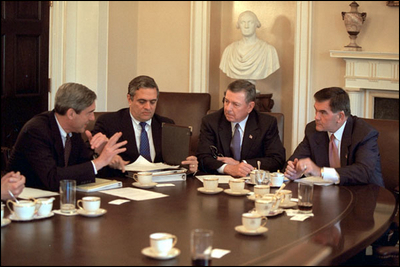
Today, the Hospital room comedy is touted by the regime as the main reason we should accept Comey as the next FBI Director.
If that doesn't get your attention, remember this: On December 30, 2003, Comey appointed U.S. Attorney Patrick Fitzgerald to be Special Counsel on what is commonly known as the Valerie Plame Case. Fitzgerald was given extraordinary powers to hunt down the source of a leak to a newspaper reporter who (1.) never wrote a story using the information while (2.) Comey, Patrick Fitzgerald, and half of Washington DC, knew who did leak the information before...yes, before...Fitzgerald was even appointed! The reporter was Judith Miller of the New York Times. The self-confessed leaker was Richard Armitage, the Deputy Secretary of State to Colin Powell.
In retrospect, the whole Plame saga was a surrogate whizzing contest between Powell and his-not-so-good friend Dick Cheney.
Now feature this: Shortly after appointing his buddy Fitzgerald to be Special Counsel in the Valerie Plame Case, Comey went to work as the top lawyer at Lockheed Martin. They do a lot of surveillance business with the feds.
Now factor in Mark Grossman. Remember him? He was the Undersecretary of State who reported to Deputy Secretary of State Dick Armitage. Grossman wrote the memo that started the whole Plame thing – as Gomer Pyle said, "Surprise, surprise."
Coincidently, two of Marc Grossman's colleagues at the Cohen Group (that would be Cohen as in Bill Clinton's former SecDef) – namely Vice-Chair Joseph Ralston and Senior Counselor James Loy – sit on the Board of Directors at Lockheed Martin.
Joseph W. Ralston James M. Loy
You suppose Ralston and Loy were so delighted with the job that Comey and his buddy Fitz were doing keeping the Chicago/Washington/Bagdad Railroad that John Shaw exposed running, that they recommended Lockheed Martin bring Comey on board and pay him a boat load of money?
Comey's total compensation in 2009 alone was $6,113,797, which was multiple times higher than the position ordinarily paid.
Oh, and did you know that Grossman was Fitz's star witness in the Scooter Libby trial? Gee, it's a small world!
Here's a question the media never did ask: Did Grossman know Valerie Plame's husband, Joe Wilson. If so, how did he know him, and for how long? After all, Grossman and Wilson went to the same college, at the same time, and were doing the same job in neighboring countries leading up to, and during, "Operation Desert Storm." Grossman was Deputy Chief of Mission in Turkey, and Wilson was Deputy Chief of Mission in Iraq.
Think maybe they knew each other?
Do you think Chuck Schumer or any of the Senator's on the Senate Judiciary Committee will look for answers to these important questions?
Tune in to find out on the next "James B Comey Show" coming to a Senate committee hearing on your TV.
More Interesting Articles
- Laura Loomer blocks reporter from viewing her Tweets!
- Why was AE4HF founder Sherry Walker threatening patriots?
- Did the covid “vaccine” affect Scott Kirby’s menstrual cycle?
- AE4HF spokesperson: Watching my podcast without donating is “theft”!
- John C. Sullivan – quite possibly the dumbest Deep State attorney ever!
- United Airlines CEO is a World Economic Forum puppet
- “Vaccine” Mandate News: The face of AE4HF refuses to answer any questions!
- Why is AE4HF’s spokesperson scrubbing his own podcasts from the internet?
Links
- Big Government
- Bill Baar's West Side
- Chicago Daily Observer
- Citizen WElls
- Doug Ross @ Journal
- Illinois Review
- Newsalert
- PeterLance.com
- RBO2.com
- The Blaze
- The Ulsterman Report

